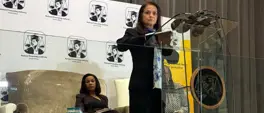From tariffs to Temu: The battle for South Africa's recovering clothing sector
Sara-Jayne Makwala King
3 December 2024 | 8:31Import tariffs play a crucial role in shaping South Africa's clothing industry.
Africa Melane is joined by Simon Eppel, Director of Research at the South African Clothing and Textile Workers' Union (SACTWU), to discuss the turnaround plan for the textile and clothing sector in South Africa.
Listen below.
Chances are, if you haven't been bombarded by adverts from online stores like Shein and Temu over the last couple of years, you don't spend much time online.
Chinese-owned manufacturers have been slammed for undercutting local retailers with their ultra-cheap fashion and benefitting from certain import tariffs, notably for goods under R500 in value.
In a bid to even the playing field, and in response to local manufacturers who argue that these underpriced imports undermine their businesses, the South African Revenue Service (SARS) now applies the full 45% tariff and VAT on all imports, regardless of their value.
Eppel says SACTWU welcomes the move and the fruits of the 2019 Retail-Clothing, Textile, Footwear and Leather (R-CTFL) Value Chain Masterplan.
"Trying to fix an industry is a complicated thing and it's a moving target so the plan will always need to adapt and change."
- Simon Eppel, Director of Research - South African Clothing and Textile Workers' Union
Eppel explains that the Masterplan aims to fix some of the structural changes in the industry and to make it more competitive.
The plan is working, he says, noting significant changes in the industry between 2019 and 2023.
"We saw the retailers who've signed that Masterplan, big South African retailers, place an additional 120 million units of orders with South African factories."
- Simon Eppel, Director of Research - South African Clothing and Textile Workers' Union
"That was actually a 50% increase in their local buying which outstripped their imports. So their localisation grew faster than their rate of imports."
- Simon Eppel, Director of Research - South African Clothing and Textile Workers' Union
Eppel says there have been other notable trends since the Masterplan was introduced.
"We've seen the volume of imports dropping in the largest, top 10 catergory of imports. We've seen the unit prices rising for nine out of 10 of those top 10 categories."
- Simon Eppel, Director of Research - South African Clothing and Textile Workers' Union
That's important because it means importers are more often realistically declaring the prices of their imports, says Eppel.
He says that means there is less customs and import fraud on those products.
ALSO READ: 'Shein and Temu are strangling South African producers and e-tailers'
Eppel says the clothing and textile industry was a foundational industry for South Africa's industrialisation.
He explains that the impact of globalisation and the country's lack of competitiveness coming out of apartheid had a significant impact on the sector.
But he says that things are improving.
"We are seeing employment growth in the industry. In places like clothing. In many parts of clothing, we've got stability."
- Simon Eppel, Director of Research - South African Clothing and Textile Workers' Union
"The Foschini Group now employs about 5,000 people in its factories."
- Simon Eppel, Director of Research - South African Clothing and Textile Workers' Union
Scroll up to the audio player to listen to the interview.
Get the whole picture 💡
Take a look at the topic timeline for all related articles.

















